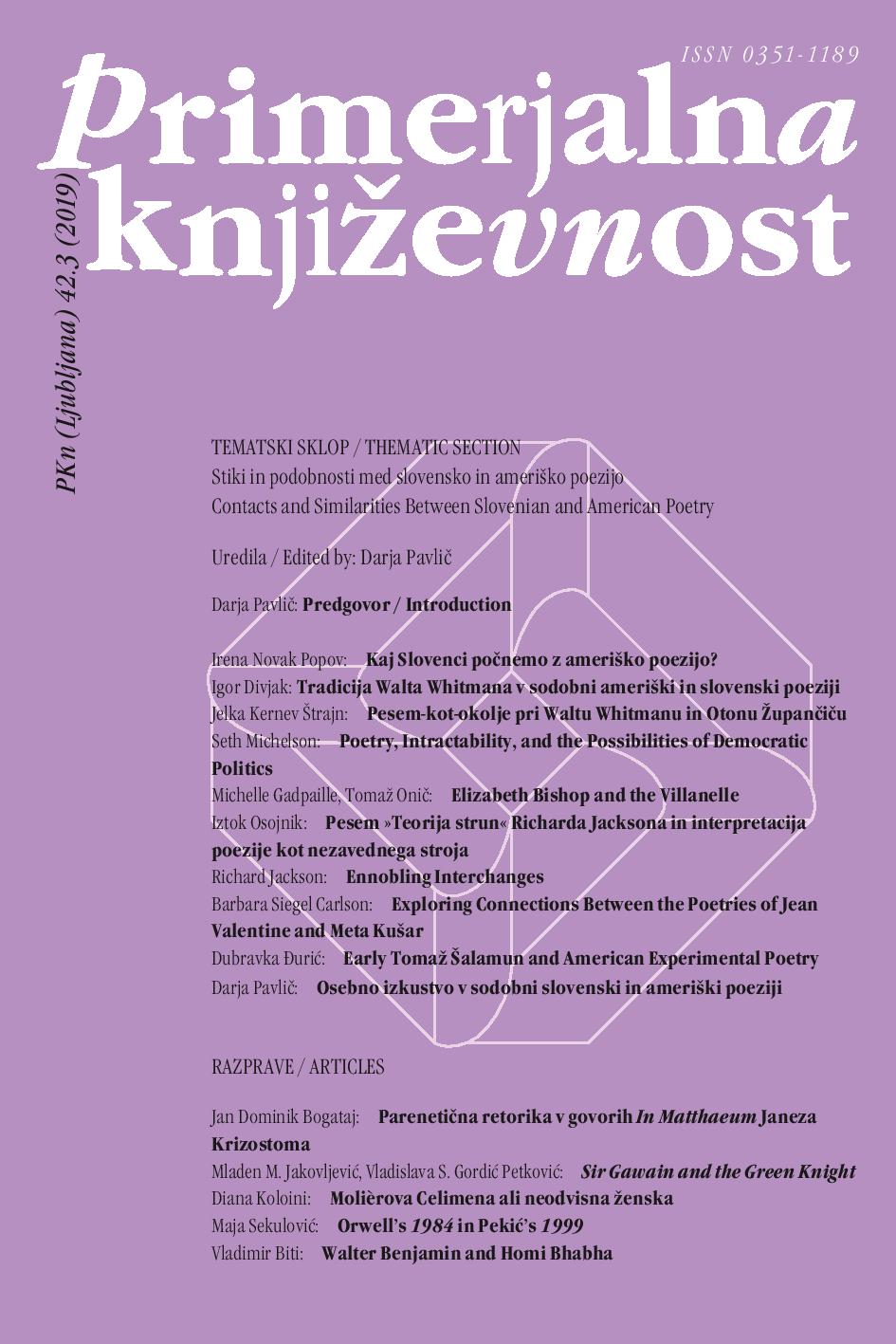The Poem “String Theory” by Richard Jackson and the Interpretation of a Poem as the Unconsciousness Machine
DOI:
https://doi.org/10.3986/pkn.v42.i3.06Keywords:
American poetry, Jackson, Richard, literary interpretation, psychoanalysis, phenomenologyAbstract
The poem “String Theory” by Richard Jackson first addresses the relationship between poetry and its interpretation (theory, physics, psychoanalysis or even philosophy). I introduce a few concepts focusing on “the stain” of the poem, caused by futility of searching for the meaning of the poem and its interpretation. Notions of its inner timeness and of the unconscious are introduced to reach beyond the conventional interpretation. How does a poem happen? When does it happen? The interpretative actualization of the poem should eradicate any particular individuality. What goes for unconscious in the Lacanian psychoanalysis goes for poetry too: unconscious workings are in the form of deformation, not in the content. So whatever subjectivity (the lyrical subject) still persists in the poem it always directs one’s attention to such deformation, a stain, a scream in the poem. How does this stain articulate itself so that it is a poem (of futile love, melancholy) but not, e.g., theory of physics, nor any mystic contemplation of the divine light? “String Theory” vibrates between fragmented dreams as subconscious language that enables the satisfaction of the unconscious and suppressed “stained” memory, the traumatic nucleus, that keeps running the recurrence of the uncomfortable feelings and distress. Hopefully my interpretative reference to the poem “String Theory” could provoke the appearance of the existential Thing that will offer itself to us as a present by unbearably evading us and that is exactly what we ascribe to the function of poetical discursivity.References
Beckett, Samuel. »Zamoči bolje (Worstward Ho)«. Literatura 26.275 (2014). 80–92.
Detela, Jure. Mah in srebro. Maribor: Založba Obzorja, 1983.
Dolar, Mladen. Bit in njen dvojnik. Ljubljana: Društvo za teoretično psihoanalizo, 2017.
Greene, Brian. The Elegant Universe. New York: Vintage Books, 2000.
Grlić, Danko. Ko je Niče. Beograd: Vuk Karadžić, 1969.
Hass, Robert. Twentieth Century Pleasures: Prose on Poetry. New York: The Ecco Press, 1984.
Heidegger, Martin. Bitak i vrijeme. Zagreb: Naprijed, 1985.
Hippel, Matthew von. »The Particle Code«. Scientific American 320.1 (January 2019). 28–33.
Jackson, Richard. The Dismantlig of Time in Contemporary Poetry. Tuscalosa in London: The University of Alabama Press, 1988.
– – –. Broken Horizons. Winston-Salem: LLC, 2018.
Kaku, Michio. Hyperspace. Oxford in New York: Oxford University Press, 1995.
Levinas, Emmanuel. Etika in neskončno / Čas in drugi. Ljubljana: Družina, 1988.
Medved, Andrej. Lacanova »zarečja«. Koper: Hyperion, Zrakogled, 2019.
Osojnik, Iztok. Somrak suverenosti. Ljubljana: KUD Apokalipsa, 2013.
Pascal, Blaise. Misli. Celje: Mohorjeva družba, 1986.
Ricoeur, Paul. Pripovedovani čas. Ljubljana: KUD Apokalipsa, 2003.
Schefer, Jean Louis. O svetu in gibanju podob. Koper: Hyperion, 2006.
Smith, Gary, ur. On Walter Benjamin: Critical Essays and Recollections. Cambridge, Massachusetts in London: The MIT Press, 1988.
Zupančič, Alenka. »Objektivni humor«. Problemi 7/8. Ljubljana: Društvo za teoretično psihoanalizo, 2018. 171–183.
Wittgenstein, Ludwig. O gotovosti. Ljubljana: LUD Literatura, 2004.


